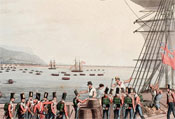
Lieutenant-General Jonathon Riley CB DSO PhD MA FRHistS
News & Diary of Engagements September 2019
2nd September
Lt General Riley Explains How the EU is taking over the UK's Defence and Intelligence Capabilities
Veterans for Britain briefing on the EU and DefenceLt-Gen Riley explains how the May government has sought to lock Britain into various EU structures created in order to establish control of Europe’s defence by the EU Commission
Special Conference - Lieutenant General Jonathon Riley
'EU Defence Union ~ The Threat to democracy, industry & alliance's
Whitehall, London
5th - National Army Museum Research and Collections Advisory Board, London
6th - RWF Trustees meeting, Wrexham
 7th September
7th September
Transcript of a briefing given by Lt Gen Riley
At the Royal United Services Institute, on the catastrophic threat to Britain’s security hidden in Mrs May’s plan to hand over our national defence to the EU.Part 1.
Read the full article on
www.conservativewoman.co.uk
 8th September
8th September
Transcript of a briefing given by Lt Gen Riley
Part 2 of the briefing given at the Royal United Services Institute...
Read the full article on www.conservativewoman.co.uk
11th - Canadian War of 1812 interpreters, Victory Services Club, London
12-13th - Commanding General and HQ US Army Africa Study period, Vicenza, Italy
 14th September
14th September
'War and Peace in the Age of Napoleon Conference'
King's College London - Session 7 - Jonathon Riley - The Fall of Detroit, August 1812
While the war against Napoleon raged in Europe, another war was brewing across the Atlantic. A war with the infant United States of America brought about by a series of factors, which became an opportunity and a cause for war-hawks in the US intent on their ‘manifest destiny’ – to control the whole continent of North America.
After President Madison’s declaration of war in June 1812, an army under General William Hull, a revolutionary war veteran, formed around the 4th US infantry regiment and contingents of militia from Ohio and Michigan was sent to Detroit. Once there, Hull invaded British territory but lost his nerve and withdrew. General Isaac Brock, assembled a force of a few hundred British regulars, volunteers from the militia and warriors from the Grand River people.
Brock took the offensive using a mixture of bravado, bluff and deception, playing on the psychology of his opponent. After a short siege, with no British casualties, Hull surrendered the fort of Detroit, its garrison and the whole of the Michigan Territory. The news hit Washington, literally, like a bolt from the blue, confounding American expectations. More importantly, the fall of Detroit convinced the people of Upper Canada that they could preserve their way of life and that surrender to the Americans was not inevitable. In London there was jubilation. Lord Bathurst, the Secretary of War, wrote to Wellington, that: “After the strong representations which I had received of the inadequacy of the force in those American settlements I know not how I should have withstood the attacks against me for having sent reinforcements to Spain instead of sending them to the defence of British possessions.” This paper will outline the strategic, operational and tactical events around the fall of Detroit, and its consequences.
Lieutenant General Jonathon Riley comes from a Yorkshire family with a history of military service. He was educated at the University College London, where he gained an MA in Geomorphology and a Master's Degree in History at Leeds University, later a gaining a PhD in Modern History, at Cranfield University. He joined the Army in 1973 and was commissioned the following year. Since then he has served peacetime tours of duty in Britain, the USA, Canada, Denmark, Germany, Kenya and Cyprus. He taught at Sandhurst from 1984-86, attended the Staff College Camberley as a student in 1987, and taught there in 1993. He was the Deputy Commandant of the Staff College, responsible for the Higher Command and Staff Course – the senior course in the college – as well as all courses for Army students, from 2001-3. On operations, General Riley has served six tours in Northern Ireland, one in Central America, five in the Balkans, one in Sierra Leone, two years in Iraq and one-and-a-half years in Afghanistan. He has commanded on operations in every rank, including being Deputy Commanding General Multi-National Division (South-West) in Bosnia, 1998-99; Commanding General, Multi-National Division (South-East) and General Officer Commanding British Forces Iraq, 2004-5; and Deputy Commanding General of all NATO forces in Afghanistan, 2007-9. He is one of a small number of British Officers to have commanded a tri-service Joint Task Force, which he did in Sierra Leone in 2000-2001. Lieutenant-General Riley is a Visiting Professor in War Studies at King’s College London and has has published twenty-three books of military history and biography. These include That Astonishing Infantry: The History of The Royal Welch Fusiliers 1689-2006 (co-authored with Michael Glover), A Matter of Honour: The Life, Campaigns and Generalship of Isaac Brock and 1813, Empire at Bay: The Sixth Coali1on and the Downfall of Napoleon.
15-20th - CG and Staff US AFRICOM Staff Ride, Normandy
22nd - Lancaster University
26th - Military Preparation College Trust Patrons Event, Tower of London
Previous News